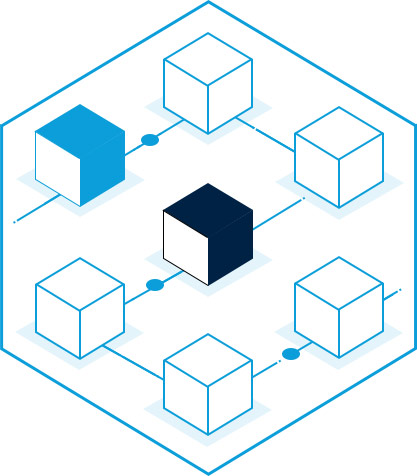
The World
by experts
Shift to Blockchain Revolution
Taste the flavor of shared economy with our enterprise blockchain solutions.
Silversoft Technologies – a leading blockchain development company – harnesses the power of blockchain and other technologies like distributed ledger and smart contracts to build scalable, asset agnostic applications such as white label exchange platforms (centralized, decentralized and P2P), smart wallets, ICO, STO, tokens and other enterprise blockchain solutions development. Our experts follow design thinking-driven approach to identify blockchain use cases and create intelligent strategies around the same to accelerate your deployments. Together, we are decentralizing the world by combining our deep domain expertise and rich experience to deliver blockchain solutions at enterprise scale.

Blockchain Offerings
White Label Exchange Development

Peer to Peer Platform Development

Blockchain Based MLM Software Development
ICO Development and Marketing

OTC Trading
White Label Wallet Development
Stablecoin Development
Coin Development
Binance-like Exchange Development

Margin Trading
Security Token Offering

Blockchain Consulting
Smart Contract Development

P2P lending platform development

Derivatives Trading

Blockchain Solutions for the Enterprise
Industries adopting the next wave of digital business.

Blockchain in Supply Chain
Create an immutable master ledger between trading parties; use smart contracts to eliminate bad invoices; have a single system of record that is accessible to all partners involved in a transaction.

Blockchain in Finance
Simplify and accelerate cross-border payments; execute transactions and agreements automatically with smart contracts; achieve greater accuracy, transparency and traceability of transactions; improve online identity management.

Blockchain in Insurance
Create a secure ledger of information; ensure trusted and verifiable provenance information; execute terms binding the insurer and insuree, and automate payments to insuree through smart contracts.

Blockchain in Healthcare
Simplify drug traceability; create secure and tamper-proof information, achieve nationwide interoperability; automate verification of medical claims through smart contracts; streamline medical records.

Blockchain in Energy: Oil and Gas
Ensure regulated substance monitoring and reporting; fleet and fuel tracking; leverage P2P interactions, eliminate broker fees and high cost of energy trading; manage complex supply chains.

Blockchain in Retail
Simplify inventory tracking; automate consumer and B2B payments using smart contracts; proof of authenticity; protect consumer privacy by storing their information in a decentralized, tamper-proof ledger.

Blockchain in Transportation
Achieve greater visibility of supply chain; maintain trusted data across transportation and logistics ecosystem; accelerate customs clearance using smart contracts; easy coordination of documents on a shared distributed ledger.

Blockchain in Agriculture
Bring trust and transparency to supply chain; create a secure, distributed ledger of information; facilitate exchange of data within specific stakeholders using smart contracts; control weather crisis, ensure better decision making.
FAQs
Blockchain works on a peer-to-peer network of consensus algorithm, which makes the transactions trustworthy and protects them from malicious activities of any third party.
Blockchain acts as a structured database on a decentralized ledger technology. It is immutable in nature, signifying that once the data has been entered, it cannot be tampered with. Users have full anonymity and blockchain also overcomes the problem of double spending.
The main type of blockchain can be classified as public blockchain, private blockchain and hybrid blockchain. Public blockchain is an open network from where data can be accessed freely while a private blockchain is a permissioned network where a user needs to join the network to access the data. Hybrid blockchain is a mix of above two.
Blockchain technology provides the benefits of faster transaction settlement with improved transparency, security and traceability of transactions. It also improves efficiency of transactions thereby reducing the cost.











